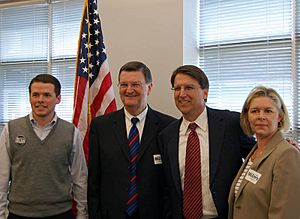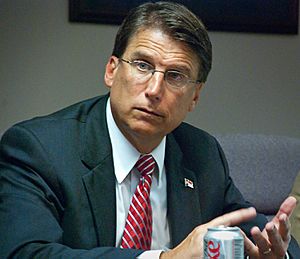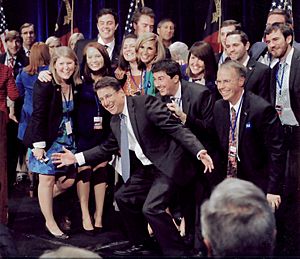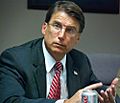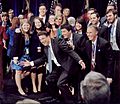Pat McCrory facts for kids
Quick facts for kids
Pat McCrory
|
|
|---|---|
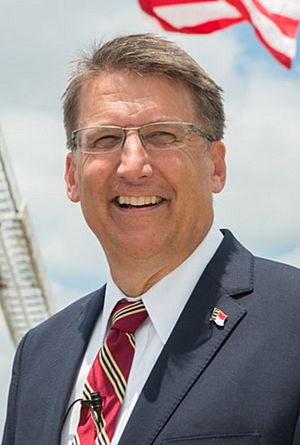
McCrory in 2015
|
|
| 74th Governor of North Carolina | |
| In office January 5, 2013 – January 1, 2017 |
|
| Lieutenant | Dan Forest |
| Preceded by | Bev Perdue |
| Succeeded by | Roy Cooper |
| 53rd Mayor of Charlotte | |
| In office December 7, 1995 – December 7, 2009 |
|
| Preceded by | Richard Vinroot |
| Succeeded by | Anthony Foxx |
| Personal details | |
| Born |
Patrick Lloyd McCrory
October 17, 1956 Columbus, Ohio, U.S. |
| Political party | Republican |
| Spouse |
Ann Sturgis
(m. 1988) |
| Education | Catawba College (BA) |
Patrick Lloyd McCrory (born October 17, 1956) is an American politician and businessman. He served as the 74th governor of North Carolina from 2013 to 2017. Before that, he was the 53rd mayor of Charlotte from 1995 to 2009. He is a member of the Republican Party.
While he was mayor of Charlotte, McCrory was part of the U.S. Homeland Security Advisory Council from 2002 to 2006. He ran for governor of North Carolina in 2008 but lost to Bev Perdue. He ran again in 2012 and won, becoming the first Republican governor of North Carolina since 1988.
In 2016, McCrory signed a law called the Public Facilities Privacy & Security Act (HB2). This law caused a lot of discussion and led to lawsuits against the state. Many companies and organizations spoke out against it. HB2 was partly changed in 2017 after McCrory lost his re-election bid.
McCrory ran for governor again in 2016 but lost to Roy Cooper. In 2022, he ran for the U.S. Senate but did not win the Republican primary.
Contents
Early Life and Career
Growing Up and College
Pat McCrory was born in Columbus, Ohio. His family moved to North Carolina when he was a child. He went to Ragsdale High School and then to Catawba College. He graduated from college in 1978 with degrees in political science and education. He married Ann Sturgis in 1988.
Business and Other Work
McCrory worked for Duke Energy for 28 years before he decided to run for governor. After his first run for governor, he worked for a sales consulting firm and a law firm. Since 2017, he has hosted a radio show in Charlotte, North Carolina.
Serving Charlotte
City Council Member
McCrory started his political career in Charlotte in 1989. He was elected as a City Councilman and served until 1995. From 1993 to 1995, he was the Mayor Pro Tem, which means he filled in for the mayor when needed.
Mayor of Charlotte (1995–2009)
In 1995, McCrory was elected mayor of Charlotte. He was 39 years old, making him the city's youngest mayor at the time. He was a very popular mayor and served for 14 years, becoming the longest-serving mayor of Charlotte.
Improving Transportation
As mayor, McCrory helped create a 25-year plan for Charlotte's transportation. He worked to get money for the city's new Lynx Light Rail system. This plan also helped expand bus services and bring light rail to the city. The light-rail line is often seen as one of his biggest achievements as mayor.
Boosting the Economy
During McCrory's time as mayor, Charlotte's population grew a lot. He helped bring new companies to the city, like TIAA-CREF and The Westin Hotel. The Charlotte Arena and the U.S. Whitewater Center also opened during his term.
National Role
McCrory was involved in many national groups. President George W. Bush appointed him to the U.S. Homeland Security Advisory Council in 2002.
Bringing NASCAR to Charlotte
As mayor, McCrory led the effort to bring the NASCAR Hall of Fame to Charlotte. In 2006, Charlotte was chosen over other cities to be the home of the Hall of Fame.
Community Efforts
McCrory worked to make Charlotte a greener city. He created rules that required developers to save trees in new neighborhoods. He also made sure new subdivisions had sidewalks and helped fund sidewalks in older areas to encourage walking. He also added bike lanes throughout the city.
He started the Mayor's Mentoring Alliance in 1995 to help young people. Charlotte was named one of the '100 Best Communities for Youth' in 2005 because of these efforts.
Running for Governor
2008 Campaign
In 2008, Pat McCrory decided to run for governor of North Carolina. He won the Republican primary election. In the general election, he ran against Bev Perdue, the Democratic candidate. It was a very close race, but McCrory lost to Perdue.
Time Away from Office (2009–2012)
After his 2008 loss, McCrory decided not to run for mayor again. He returned to working in the private sector. However, he stayed active in the North Carolina Republican Party, speaking at many events and preparing for another run for governor.
2012 Campaign
In 2012, Governor Bev Perdue decided not to run for re-election. Pat McCrory announced his candidacy for governor again. He won the Republican primary with a large number of votes. In the general election, he defeated Democratic Lieutenant Governor Walter Dalton. McCrory won with 55% of the vote, which was a big victory for a Republican in an open race for governor since the Reconstruction period.
During his campaign, McCrory talked about his plans for the economy and education. He wanted to reduce unemployment and change North Carolina's tax laws. For education, he supported more technology in classrooms, better pay systems for teachers, and expanding charter schools.
Governor of North Carolina (2013–2017)
Pat McCrory became governor on January 5, 2013. He was the first Republican governor of North Carolina since 1993. With his election, Republicans gained control of both houses of the General Assembly and the governorship for the first time since 1870.
New Laws and Policies
As governor, McCrory signed several new laws.
- He signed a law that changed unemployment benefits, reducing the amount of time people could receive help.
- He chose not to expand the Medicaid program in North Carolina, which would have provided healthcare coverage to many people.
- He signed a law that required voters to show a government-issued photo ID to vote. This law was later challenged in court.
- He signed tax reform laws that changed the state's income tax system.
- He signed a law that allowed fracking (a way to get natural gas) in the state.
Changes Before Leaving Office
After he lost the 2016 election, McCrory signed some laws that reduced the power of the North Carolina governorship. These changes were temporary blocked by judges.
Vetoes
McCrory used his power to veto (reject) some bills passed by the General Assembly.
- In 2013, he vetoed a bill that would have required people applying for welfare benefits to pass a drug test.
- In 2015, he vetoed a bill that would have allowed officials with religious objections to refuse to perform same-sex marriages.
- He also vetoed a bill related to farming practices.
However, the General Assembly had enough votes to override his vetoes, meaning these bills still became law.
Education Focus
McCrory signed some of the largest education budgets in North Carolina's history. He supported paying teachers based on their performance. During his term, North Carolina's teacher pay ranking improved. He signed a law in 2016 that led to a significant pay raise for teachers.
He also made comments about higher education, suggesting that public colleges should focus on courses that lead to jobs.
"Moral Mondays" Protests
During McCrory's time as governor, there were ongoing protests called "Moral Mondays." These protests were organized by religious leaders and others who disagreed with some of the new laws and policies, especially those related to voting, healthcare, and education.
Public Facilities Privacy & Security Act (HB2)
On March 23, 2016, Governor McCrory signed the Public Facilities Privacy & Security Act, known as HB2. This law removed some anti-discrimination protections and said that in government buildings, people could only use restrooms that matched the sex on their birth certificates.
This law caused a lot of controversy. Many companies, sports leagues like the NBA and NCAA, and other states protested by pulling events and investments from North Carolina. McCrory tried to make some changes to the law and encouraged the city of Charlotte to change its own rules to help resolve the issue.
The United States Department of Justice and other groups filed lawsuits against the state because of HB2. After McCrory lost his re-election, the law was changed on March 30, 2017.
2016 Gubernatorial Campaign
McCrory ran for a second term as governor in 2016 against Roy Cooper. It was a very close election. McCrory lost the election, making him the first sitting Governor of North Carolina to lose a re-election bid since 1850.
Running for U.S. Senate (2022)
In 2022, Pat McCrory ran for the Republican nomination for a seat in the United States Senate. He lost the primary election to Ted Budd.
Images for kids
See also
 In Spanish: Pat McCrory para niños
In Spanish: Pat McCrory para niños
 | Valerie Thomas |
 | Frederick McKinley Jones |
 | George Edward Alcorn Jr. |
 | Thomas Mensah |


